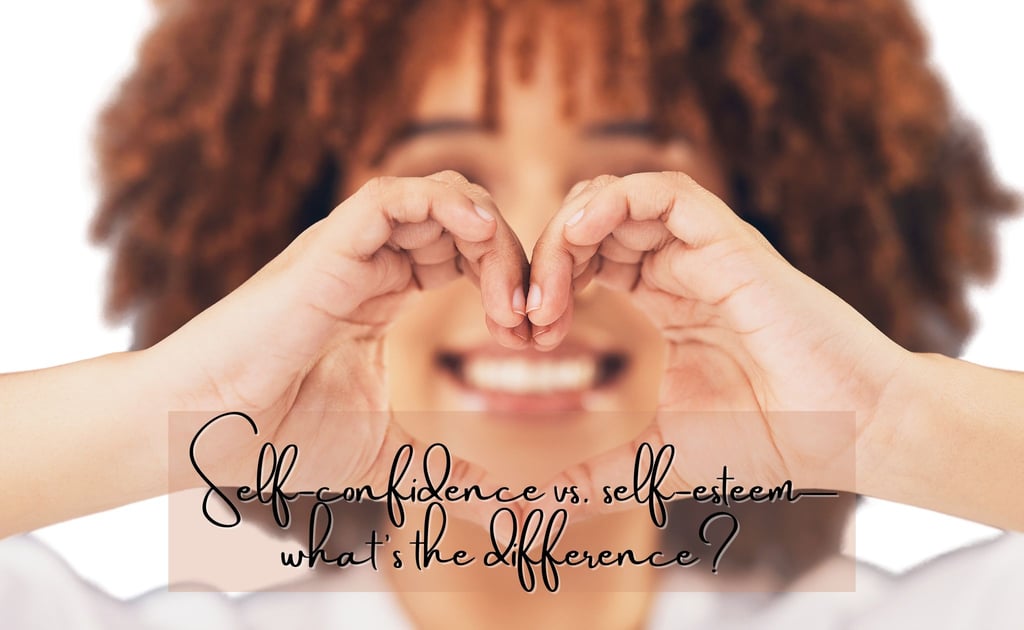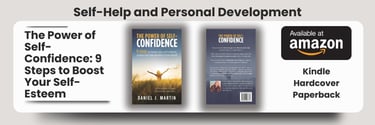Understanding the Difference Between Self-Confidence and Self-Esteem: A Guide for Women
Self-confidence vs. self-esteem—what's the difference? Explore our helpful guide for women to enhance your understanding and personal development.
SELF CARE AND PERSONAL GROWTH
Shari Smith
2/12/20258 min read
As an Amazon affiliate, we earn commissions at no extra cost to you if you click our links and make a purchase.


Picture the feeling when you know you've nailed a presentation, or when you genuinely like the person looking back at you in the mirror. These moments capture the essence of self-confidence and self-esteem, two terms often mixed up yet so distinctly different.
Understanding their difference isn't just a matter of semantics; it's a journey into what empowers us from the core. Self-confidence is about trusting your abilities. It's the assurance you feel knowing you can tackle what's in front of you. Self-esteem goes deeper—it touches the heart of how much you value yourself, regardless of your accomplishments.
Knowing the difference helps guide us in nurturing both aspects, especially for women striving for authentic personal growth. Let's explore this with warmth and encouragement, helping you embrace the wonderful person you are meant to be.
Think of self-confidence as that quiet yet powerful force inside of you that whispers, "You've got this." It's not about being perfect or never doubting yourself.
Instead, it's about knowing that, no matter the outcome, you're capable and will handle whatever comes your way. For many women, understanding self-confidence and its nuances can be transformative, unlocking doors to personal growth and fulfillment.
Defining Self-Confidence


Characteristics of Self-Confidence
Self-confidence is more than just a bold presence; it's expressed through various traits that shine through in everyday actions and decisions. Some of the key characteristics include:
Self-assurance: Believing in your abilities without the constant need for validation. You recognize your worth, even when others don't.
Resilience: The ability to bounce back from setbacks. You see failures as opportunities to learn rather than roadblocks.
Openness to new experiences: Trying new things without letting fear hold you back. Each step forward is a chance to grow.
Decisiveness: Making choices with confidence, trusting your judgment and intuition.
Positive self-talk: Maintaining an inner dialogue that supports and encourages, like a loyal friend cheering you on.
These attributes often manifest in how you interact with the world, giving you the courage to speak up and the patience to listen.
Building Self-Confidence
If you're looking to boost your confidence, you're not alone. It's a journey many women embark on, and there are practical steps you can take to nurture this quality:
Set small goals: Start with achievable tasks that build your confidence in handling bigger challenges.
Acknowledge achievements: Take time to celebrate your successes, no matter how small. Each victory reinforces your belief in yourself.
Surround yourself with positivity: Spend time with those who uplift and inspire you. Their energy can be contagious.
Practice self-care: Prioritize your well-being. When you feel good physically and mentally, it's easier to feel confident.
Challenge negative thoughts: Whenever self-doubt creeps in, counter it with evidence of your past successes.
Remember, building self-confidence doesn't happen overnight. It's like planting a seed and nurturing it over time, and each act of self-kindness feeds this growth.
Impact of Self-Confidence on Daily Life
When you embrace self-confidence, it touches every part of your life in ways that can be profoundly empowering:
Career: Confidence can propel you into leadership roles or help you advocate for what you need at work. It grants you the courage to voice your ideas and take initiative.
Relationships: With confidence, relationships become more about mutual respect. You communicate your needs clearly and set healthy boundaries.
Personal development: It encourages you to pursue your passions and hobbies, nurturing your talents and expanding your horizons.
Imagine self-confidence as your partner in all ventures, cheering you on. It becomes a silent partner in your success, reminding you that you are more capable than you sometimes believe. In embracing your self-confidence, you pave the path for a fulfilling, empowered life.
In our journey to understand self-confidence and self-esteem, it's crucial to explore self-esteem's unique role. It's the quiet yet powerful belief in your inherent worth, not tied to accomplishments or others' perceptions.
It shapes how you see yourself every day, influencing both emotional and psychological well-being. Understanding its essence helps set a strong foundation for personal growth and fulfillment.
Understanding Self-Esteem


Characteristics of High Self-Esteem
High self-esteem manifests in various positive traits. Those with it carry a quiet certainty in their worth, which can be seen in their daily actions and mindset. Let's look at some everyday characteristics:
Self-acceptance: Embracing faults and strengths alike, without constant comparison to others.
Authenticity: Being true to oneself, even when it means standing out or going against the grain.
Positive outlook: Seeing challenges as opportunities for growth, not threats.
Healthy boundaries: Knowing when to say no, and understanding that doing so is a part of self-care.
Self-compassion: Treating oneself with kindness, especially when mistakes are made.
These traits aren't loud or boastful but rooted in a deep sense of inner peace and respect for oneself.
Factors Affecting Self-Esteem
Various factors can influence our self-esteem. Understanding these can help us nurture it better. Here are some common influences:
Societal pressures: The constant barrage of media images and expectations can lead to self-doubt.
Family dynamics: Early interactions with family can shape how we view ourselves.
Past experiences: Neglect, trauma, or criticism can leave lasting impressions.
Peer influence: Friends' opinions and behaviors can affect self-esteem positively or negatively.
Culture: Cultural norms and values play a role in self-worth perceptions.
By recognizing these factors, we can begin to counteract negative influences and reinforce the positive ones, paving the way for a healthier self-image.
Ways to Improve Self-Esteem
Improving self-esteem is a personal journey and can be especially empowering for women. Here are some practical, everyday tips to help:
Practice gratitude: Regularly acknowledge and appreciate the good in your life and within yourself.
Challenge negative thoughts: Replace them with affirmations that reinforce your inherent worth.
Celebrate small victories: Honor your achievements, regardless of their size, as they build momentum and confidence.
Engage in self-care regularly: Take time for activities that nourish your body and mind, from exercise to meditation.
Seek supportive environments: Surround yourself with people who uplift and appreciate you.
These actions may seem simple, but they can work wonders over time, transforming how you view and value yourself. Remember, improving self-esteem isn't about perfection; it's about progress and accepting yourself along the way.
Imagine self-confidence and self-esteem as two sides of a coin, each holding its own value but contributing to a whole sense of self-worth. Understanding the differences between them can help you navigate that journey more clearly.
Key Differences Between Self-Confidence and Self-Esteem


Emotional vs. Behavioral Aspects
Self-esteem is like your internal compass, guiding how you feel about yourself at a deeper level. It's tied to your intrinsic sense of worth and self-respect.
Imagine it as the roots of a tree, grounding you with a strong foundation. These roots help you stand tall through life's ups and downs, offering a sense of inner peace. It's more about how you value yourself, no matter the external circumstances or outcomes.
On the other hand, self-confidence often shows up in our actions—how we approach tasks and challenges. Think of it as the branches of that same tree, reaching out and exploring new opportunities.
It reflects competence and skill in various areas, from work to personal endeavors. Self-confidence can ebb and flow with experiences, like acing a presentation or learning a new skill, impacting your readiness to take on the world.
But remember, it’s not about being flawless; it’s the belief that you can handle what's ahead.
Self-Perception and Self-Worth Distinctions
Self-esteem shapes your self-perception, influencing how you see and accept yourself. It’s the cozy sweater you wrap yourself in, one that assures you’re valued just as you are, without needing external validation.
For women, this can be particularly empowering, standing firm against the societal pressures to constantly achieve or change. Self-esteem remains steady whether you’re dressed up for a night out or in your favorite loungewear.
In contrast, self-confidence affects how you perceive your capabilities. It's like finding your favorite pair of shoes that, while they may get scuffed, still make you feel ready to tackle whatever lies ahead.
Women often juggle multiple roles, and self-confidence plays a key role in stepping into each one with assurance. Whether it's handling a meeting at work or managing household chaos, it's about trusting your skills and decisions, even when they’re put to the test.
Understanding these differences can help you nurture both areas effectively, enriching your journey towards self-discovery and empowerment.
Think of self-esteem as the soil that nurtures the garden of your self-confidence. When you value yourself deeply, it becomes easier to trust your abilities. Imagine waking up each morning with a gentle reminder that you are enough, just as you are. This assurance provides a sturdy foundation for confidence to flourish.
Interconnection Between Self-Confidence and Self-Esteem


Self-Esteem as a Foundation for Self-Confidence
A strong sense of self-worth can spark a radiant sense of confidence. When you hold yourself in high regard, it translates into believing you deserve success and happiness. This inner acknowledgment acts as a bedrock, giving you the courage to try new things and take risks.
It’s like building a house; self-esteem serves as the foundation, sturdy and stable, supporting each brick of confidence you lay.
In practical terms, when you genuinely appreciate yourself, you’re less likely to seek validation from external sources. This self-assuredness allows your confidence to shine through, unaffected by others’ opinions or setbacks.
It empowers you to step forward with conviction and grace, knowing that missteps are simply part of life's dance.

Balancing Both for a Fulfilling Life
Finding harmony between self-confidence and self-esteem can transform your experience, providing a sense of personal empowerment. How do we achieve this balance? Picture self-esteem as your inner cheerleader, reminding you of your worth, while self-confidence is the performer, showcasing your strengths to the world. Both are essential, yet balancing them is key.
To keep this equilibrium, start by practicing self-reflection and self-compassion. These habits allow you to recognize your value and build resilience against life’s challenges. Engage in activities that bring joy and celebration of your abilities, reinforcing both self-esteem and confidence in tandem.
Here are a few simple ways to nurture this balance:
Self-care rituals: Simple acts like journaling or meditation can enhance your self-esteem, which in turn, boosts confidence.
Goal setting: Aim for realistic goals. Each achievement solidifies your belief in your capabilities.
Positive affirmations: Speak kindly to yourself. Affirmations can serve as daily reminders of your inherent value.
Remember, the relationship between self-confidence and self-esteem is a journey, not a destination. As you travel this path, embrace both qualities with kindness and patience. They are your trusted allies, ready to help you move forward with each step you take.
Conclusion
Self-confidence and self-esteem may seem like two sides of the same coin, but understanding their distinct roles enriches our personal journey. Self-confidence is the trust in our abilities, allowing us to face the world with courage and grace. Meanwhile, self-esteem is the deep-seated appreciation of our inherent worth, independent of our achievements.
When we nurture both, we're not only embracing our full selves but also paving the way for a life filled with purpose and fulfillment. As women, it's empowering to hold these qualities close, using them as tools to celebrate our uniqueness and resilience.
To you, the reader: consider this an invitation. Reflect on your journey and explore ways to strengthen both self-confidence and self-esteem. How might this change the way you engage with the world? Share your thoughts and let’s continue this conversation together. Thank you for being here—your presence and insight matter.






